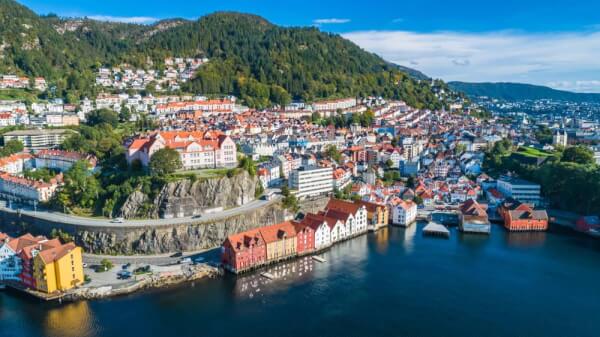How to order from Amazon in Norway
Planning a visit to the land of fjords and Northern Lights, or perhaps you're already a resident of Norway? Whether you're an expat or a local, thinking about...

Almost 14% of the total population of Norway are immigrants, with one third travelling to Norway specifically to find work. Despite the notoriously high taxes and prices, the standard of living available in Norway continues to draw in people from all over the globe. The access to glorious countryside, globally renowned cultural sites, as well as summer’s mild climate and 24-hour daylight only add to the appeal.
The major cities have significant expat communities. In particular, large international businesses across the financial and energy sectors pull in foreign talent regularly.
If you’re going to Norway for work, either because you have a new job lined up already or to start a new business for yourself, you might need a visa in order to do so. Luckily, there’s no need to worry because the Norwegian authorities have a simple and intuitive process to make your application. Here is a quick guide to getting a Norwegian work visa.
Your first priority should be to figure out if you need a work permit at all. In some cases, depending on your nationality and the role you’re going to take on, a permit might not be necessary.
If you’re from the European Union (EU) or European Economic Area (EEA) you don’t need a permit to live, work or study in Norway. However, you do need to register your stay with the local police if you’re there for more than 3 months.
Third country nationals will usually need a permit. Norwegian Immigration Authorities' work immigration guide has a handy form where you simply enter your nationality along with the reason for your visit, and your visa options are explained.
Migration to Norway is regulated by the Norwegian Immigration Authorities (UDI). There are various different visa routes for workers, depending on your situation. If you’re coming to Norway to work in a professional capacity or to start your own business, the skilled workers visa route is commonly used.
Norway isn’t covered by the EU Blue Card scheme which applies in many other countries in Europe.
To get a visa under the skilled workers scheme, you must be working at a professional level job, and have the relevant qualifications or licenses to carry out that work. You usually need to have a solid job offer for full time work, and a salary rate which is no less than the Norwegian average salary. If you want to come to Norway to work in a part time capacity or for multiple employers, you may still get a visa, but you’ll have to explain your situation in detail as part of the application process.
There are some exceptional cases where you don’t need a job arranged in advance of coming to Norway. This mainly applies if you’re a citizen of a country with special reciprocal visa agreements with Norway, and have a realistic prospect of securing skilled work when you arrive there. In this case you might be given a short term permit for up to six months, which gives you the time to settle in Norway and look for a role. Once you have a job offer, and before you start to work, you can then change your permit to one that allows you to work legally. Find out if this applies to you by completing UDI's self assessment form online.
Regardless of your visa type, your application can be submitted in person at your local Norwegian embassy, or you can give written power of attorney to your employer to make the application on your behalf. UDI’s form from above also finds the application routes open for you.
The Norwegian work visa application fee varies according to the visa type required, but is usually in the region of 3,200 to 3,700 NOK. In some cases there are additional fees depending on where and how you submit your application. UDI’s website also has a time processing calculator for your visa application based on where and how you submitted it. On average a skilled worker visa submitted at a local embassy takes four or five weeks to process.
You can also track your application on the same site by entering your personal details.
There's a convenient document checklist for when handing in your visa application based on your nationality and visa type. You can expect to need to provide the following:
Valid passport
Completed application form and checklist of documents provided
Two recent passport photos
Details of your CV and qualifications
Proof of your job offer, and salary agreed
Evidence of where you will live in Norway
Depending on your circumstances you might also have to explain your current situation and proposed working conditions. For example if you’ll work less than full time or for multiple employers.
All documents must be presented in either English or Norwegian. If the originals are in another language you’ll need to have them translated and certified.
In some cases, if you plan to be in Norway for less than three months, you can go without a specific work permit. This exemption is related to both your nationality and the role you intend to do. The Immigration Authority website details who can work in Norway for less than three months without a residence permit.
You can get a specific visa to come to Norway as an au pair. This visa programme comes with strict criteria for both the au pair and the host family. There’s also a seasonal worker visa which can be issued for up to six months, and requires you to have a firm job offer before applying. This will only be issued for workers in certain industries such as agriculture and fishing.
If you want to start a business in Norway, you’ll usually have to apply for a skilled worker visa and open a local sole proprietorship business. To get the permit you need, you’ll have to show you have the right experience, training or qualifications to make your business a success, and you should expect to achieve an annual gross profit of 236,406 NOK or more. In this case, you can also apply for your family to come to Norway with you.
If you don’t want to set up your own business in Norway, you can still get a skilled worker visa if you’re contracted to work with a Norwegian company. There are some other constraints on this visa type, including you can only have a permit for two years, and are then required to live outside of Norway for at least another two years before you can reapply. You’ll only be able to apply to have your family join you if you have a contract to work with a local company for over six months agreed in advance.
If you have a residence permit as a skilled worker, you can usually bring your family members to Norway with you. To be eligible for this scheme, you must prove your ability to support your family. For example, to bring your spouse to Norway with you, you have to earn at least 306,700 NOK per year gross salary. The exact amounts needed vary according to who you’re bringing with you.
The scheme extends to partners, children and in some cases dependant parents. You’ll be asked to prove the family relationships, and to be eligible you also can’t have received social security benefits during the last 12 months.
To obtain your residence permit you must visit your local Norwegian police within the first week of arrival, or as soon as possible if there are no appointments available within that time. They’ll have your photo and fingerprints taken for your residence permit card. You can arrange an appointment through the immigration application portal or in person.
You’re also obliged to register with the tax authorities to make sure that you’re paying the right taxes. The tax authorities' short questionnaire reveals the information relevant for you. It varies a little depending on your visa type.
From there, you’ll probably want to open a local bank account in Norway. If you’ll need to send money from abroad to get started, the cheapest way is generally to use a service called Wise rather than through your home bank. Because Wise’s system uses two local bank transfers instead of one expensive international transfer, it’ll end up quite a bit cheaper than using your bank. Not to mention, Wise also exchanges your money between currencies using the real mid-market rate. In the end, it should help you have a bit more money for your new venture.
Good luck!
*Please see terms of use and product availability for your region or visit Wise fees and pricing for the most up to date pricing and fee information.
This publication is provided for general information purposes and does not constitute legal, tax or other professional advice from Wise Payments Limited or its subsidiaries and its affiliates, and it is not intended as a substitute for obtaining advice from a financial advisor or any other professional.
We make no representations, warranties or guarantees, whether expressed or implied, that the content in the publication is accurate, complete or up to date.

Planning a visit to the land of fjords and Northern Lights, or perhaps you're already a resident of Norway? Whether you're an expat or a local, thinking about...

Everything you need to know about moving to Norway from the UK, including visas, cost of living, property and more.

Cost of living in Norway varies from region to region. This guide outlines what you can expect in terms of living costs.

Norway is a fantastic destination if you’re an expat looking to live and work abroad somewhere with friendly people, an interesting heritage, and awesome...

Looking for a new job? How about a chance to go to school in a completely new place? Ready to retire? Need some adventure in your life? Those are just a few...

Sometimes hailed as “the most liveable place on earth,” Norway is often coveted for it’s beautiful natural landscape, attracting hundreds of thousands of...